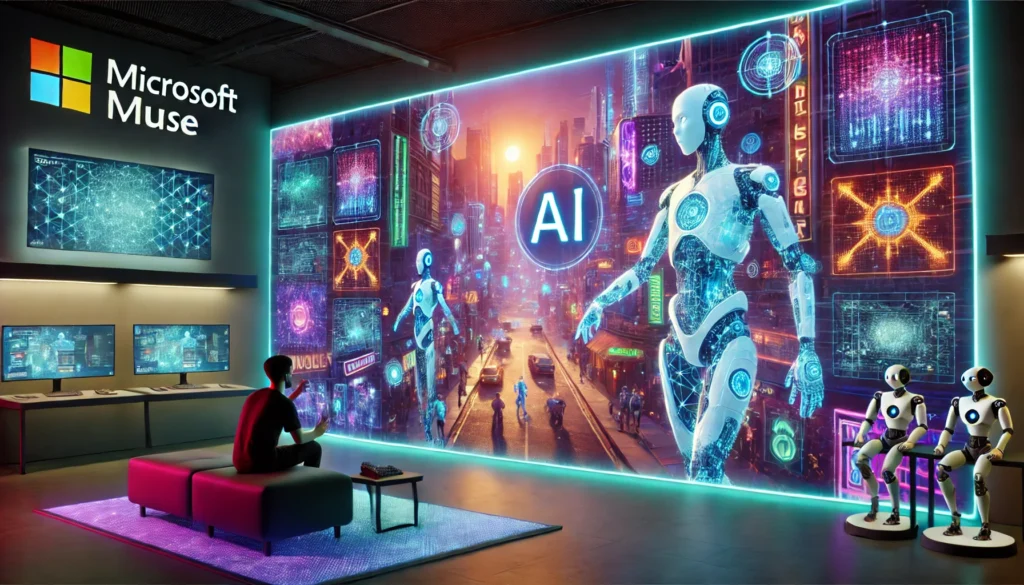Microsoft Debuts Muse: How Generative AI is Changing the Future of Gaming
Microsoft has officially unveiled Muse, a groundbreaking generative AI model designed to revolutionize the way video games are developed, played, and preserved. This innovation, developed in collaboration with Xbox Game Studios’ Ninja Theory, is set to change the landscape of gaming by integrating AI-driven content generation directly into game development processes.
What is Microsoft Muse?
Muse is a generative AI model that learns from gameplay data to create realistic in-game environments, animations, and interactions. Unlike traditional AI models that rely on predefined scripts and behaviors, Muse uses machine learning to adapt to gameplay patterns, making it capable of generating new game content in real time.
The AI was trained using data from the 2020 multiplayer game Bleeding Edge, allowing it to understand 3D game worlds, physics, and mechanics. By analyzing gameplay footage, Muse can recreate movements, character interactions, and even develop game sequences based on player input.
How Muse is Transforming Game Development
1. Procedural Content Generation
Muse enables developers to automate the creation of expansive game worlds, reducing the time and resources needed to build complex environments. This could lead to richer open-world games with dynamically generated landscapes that feel unique for every player.
2. Game Animation & Character Behavior
Muse can generate lifelike animations based on real player interactions, making characters behave more naturally. It can also create non-playable character (NPC) behaviors that are more responsive to player actions, improving realism and immersion.
3. Adaptive Game Design
The AI can modify game mechanics on the fly based on how players interact with the environment. This means that difficulty levels, enemy placements, and mission objectives can adjust dynamically, offering a more personalized gaming experience.
Muse and Game Preservation
One of the most promising aspects of Muse is its potential to preserve classic games by learning their mechanics and making them compatible with modern hardware. Microsoft Gaming CEO Phil Spencer has suggested that Muse could help adapt legacy games, ensuring they remain playable across generations of consoles. This could be a game-changer for fans of retro and classic titles that risk becoming obsolete due to outdated technology.
Industry Reactions: Excitement & Concerns
While many in the gaming industry are excited about Muse’s potential, some developers and artists have expressed concerns about AI’s role in creative fields. David Goldfarb, founder of The Outsiders, voiced skepticism, suggesting that AI-generated content might devalue the artistic and aesthetic efforts of human game designers.
On the other hand, Microsoft maintains that Muse is designed to augment human creativity, not replace it. The company plans to make AI tools accessible to both developers and players, allowing studios to decide how much AI should influence their projects.
What’s Next for AI in Gaming?
As Muse continues to evolve, its impact on game development will depend on how studios integrate it into their workflows. AI-driven tools like Muse could pave the way for:
- AI-assisted level design, reducing development time for large-scale games
- More interactive NPCs that learn from player behavior
- Faster game porting for classic and indie games
Whether Muse becomes a staple in game development or faces resistance from traditional designers, one thing is clear: AI is becoming an integral part of the gaming industry’s future.
Final Thoughts
Microsoft’s introduction of Muse marks a significant shift toward AI-powered gaming experiences. Whether it’s generating immersive environments, animating characters, or helping preserve classic games, Muse has the potential to redefine how games are made and played. As developers navigate the balance between AI automation and human creativity, the future of gaming has never looked more exciting.
What are your thoughts on AI in gaming? Do you see it as a game-changer or a creative challenge? Let us know in the comments!

